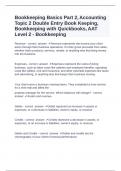Exam (elaborations)
Bookkeeping Basics Part 2. Question and answers verified to pass 2024
- Course
- Institution
Bookkeeping Basics Part 2. Question and answers verified to pass 2024 Bookkeeping Basics Part 2, Accounting Topic 2 Double Entry Book Keeping, Bookkeeping with Quickbooks, AAT Level 2 - Bookkeeping Revenue - correct answer Revenue represents the income your client earns through their business...
[Show more]



